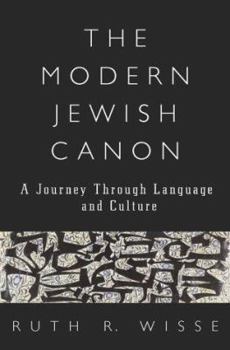The Modern Jewish Canon: A Journey Through Language and Culture
Select Format
Select Condition 
Book Overview
What makes a great Jewish book? In fact, what makes a book Jewish in the first place? Ruth R. Wisse eloquently fields these questions in The Modern Jewish Canon, her compassionate, insightful guide to... This description may be from another edition of this product.
Format:Hardcover
Language:English
ISBN:0684830752
ISBN13:9780684830759
Release Date:September 2000
Publisher:Free Press
Length:395 Pages
Weight:1.50 lbs.
Dimensions:1.2" x 6.4" x 9.0"
Customer Reviews
3 ratings
Wonderful exploration of the field of Jewish literature
Published by Thriftbooks.com User , 17 years ago
This is an absorbing and inspiring book. It moves though in a largely chronological sequence from the late 19thC to the late 20thC. Ruth Wisse has selcted particular authors and books to illustrate the changes in Jewish literature during this period. Her exploration of the changes in literature has also led to a wide map of Jewish life over the past centuary. The Modern Jewish Canon has a book list as an appendix. Divided into time periods this is a wonderful guide to future reading of Jewish literature.
A valiant effort
Published by Thriftbooks.com User , 20 years ago
Professor Wisse brings her tremendous learning to bear in this effort to define a modern Jewish canon. She is as would be expected especially strong on Yiddish Literature and her section on Singer is very illuminating. However whether or not she succeeds in truly defining a canon is very questionable. For a canon implies a certain community consensus , and this is really an effort of an individual scholar. I do not think here it is important to quarrel with individual selections, but rather simply to indicate that the exercise as a whole is an academic one, and not a down- to -earth practical realistic one. Another point. The real feel of Kafka or Singer or Bellow or the Ishbitzer or the Kotzker or Rabbi Shlomo Carlebach or any other ' creator ' of modern Jewish literature is given in their writing, and their writing alone. The ' canon' is their work,and not a literary work written about the canon. And another point which my previous examples make. There are vast worlds of Jewish creative religious literature which certainly should be part of any modern Jewish literary canon. This suggests that the borders of the canon should be much wider than those drawn by Wisse. Her effort thus is a valiant one but in my judgment one of only limited success.
A learned, warm, and witty book
Published by Thriftbooks.com User , 24 years ago
This humane and compassionate book is the kind of scholarship I thought had vanished in a morass of structuralism, deconstruction, hermaneutics, and the other polysyllables of Academic Mandarin. Professor Wisse fulfills the subtitle of her book on Hebrew, Polish, English, Yiddish, Russian, and German literature dealing with Judaism and Jewish life: a journey through language and culture. It is a journey that describes life on the kibbutz, in the ghetto, in the Pale of Settlement, in the camps, and in the United States and sets all of these Jewish lives in their context of Western history and literature and politics.I don't read or speak most of the languages in which these literatures are written. I'm not familiar with most of the texts, which is my loss. Professor Wisse manages, through quick descriptions and well-chosen quotations, to give a careful reader some notion of a field that is unfamiliar. I don't think I'll ever think of some of these writers again without thinking how they put their religion, their politics, and their lives on the line. This is especially moving when she comes to the description of the Holocaust (Shoah in Hebrew; Khurbn in Yiddish). Most of us are familiar with the DIARY OF A YOUNG GIRL (Anne Frank). What I didn't know was how many diarists whose names are unknown except to scholars and (like the Unknown Soldier) to God wrote as the means of combat available to people of the Book: keeping the record; literary resistance. Her summation of this section is memorable: "Like soldiers who die for their country, these Jews obeyed the imperative to document over the imperative to live."Her section on Nobel Laureate Isaac Bashevis Singer combines biographical information on a famous writing family, shrewd psychoanalytic and textual criticism, and then opens up to the larger context of English literature. Her discussion of Tevye the Dairyman as a kind of inverse of King Lear is a revelation, and her comments on the vastly successful FIDDLER ON THE ROOF simultaneously set it at its rightful value as Judaism and its much larger value as a document of popular culture and a talisman for many cultures. And not much later on, she's talking about Gershom Scholem, the Cabalist scholar.What's impressive about this entire section (in addition to what I've mentioned) is that she deals with this literature as itself, without resorting to comparisons such as "this is magical realism, only it's not Latin American."She isn't afraid to speak with her own voice, which is one of strong convictions and considerable, balanced wit. I howled at the Yiddish version of Eliot's "Love Song of J. Alfred Prufrock" that she quoted, and I laughed even more at the way she dealt with Leon Uris' EXODUS, which did indeed serve its purpose in keeping a Jewish spirit alive in Russia, surprisingly, but which she doesn't consider part of a Jewish canon, but as popular, not particularly well-written fiction that she refers to as winning Israel "the po






